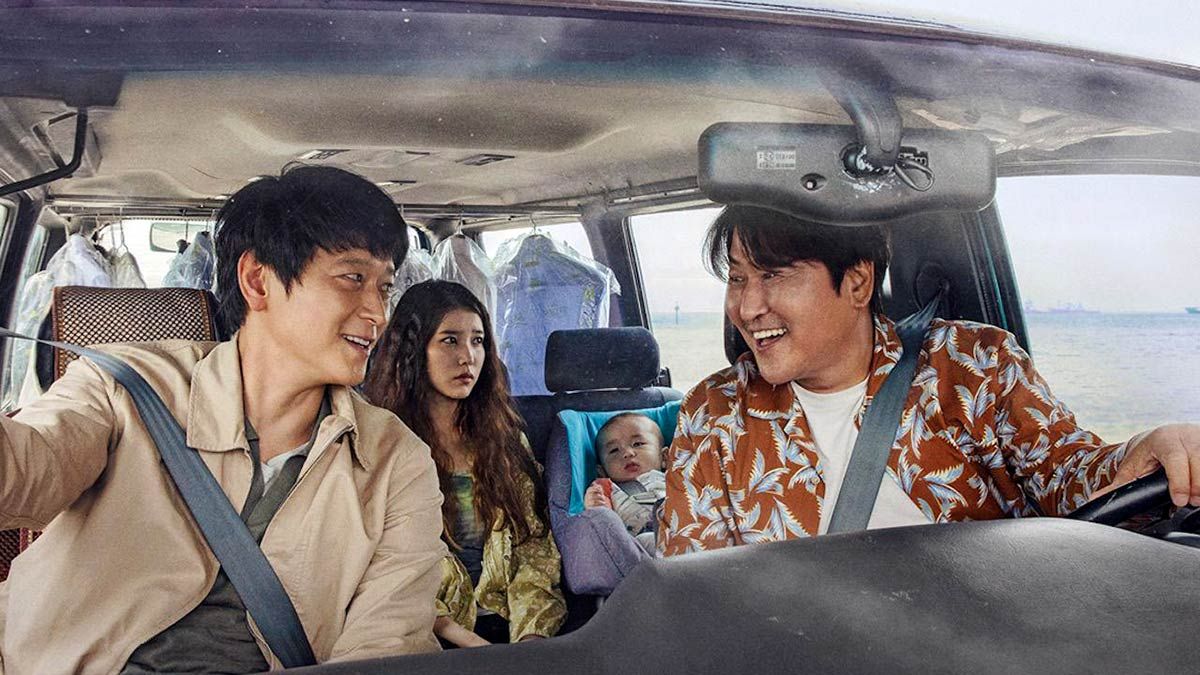On April 11, 2019, South Korea’s ban on abortion was struck down by the Constitutional Court. On January 1, 2021, abortion was finally decriminalized. That’s imperative context for a film that opens on a mother abandoning her newborn at a Busan baby box in the dead of night. Not in the box, where the nurturing yellow light would keep the baby womb-warm until someone found it. She leaves her child on the ground in front of the baby box, underneath the concrete awning of the church that houses it, rain pouring all around.
The title of writer-director Hirokazu Kore-eda’s new film is also the job title of two of its three leads: Broker. They’re like most other brokers: they sell goods on behalf of an invested owner. It’s just that instead of money-grubbing elite, they sell on behalf of anonymous new mothers. And instead of, let’s say, real estate, they sell babies. It sounds downright evil, but it’s quite the opposite. They traffic children in a good way.
Sang-hyun (Song Kang Ho) and Dong-soo (Gang Dong Won) deal in babies that have been thrown away. In other words, they save them. They search extensively for loving prospective parents who aren’t able to have their own child and / or are backlogged in the snail’s pace that is the official adoption process. But they still have to make a living, and mundane church work isn’t cutting it for Dong-soo—like running a dry cleaner extorted by the local gang isn’t cutting it for Sang-hyun. Needless to say, these are pricey, fragile, high-stakes black-market deals. And they attract federal attention.
Detectives Lee (Lee Joo Young) and Su-jin (Doona Bae) follow baby Woo-sung from the opening shot, staked out in the rain as the mother and third lead of the film, So-young (k-pop star Lee Ji Eun in her first major role), leaves him behind with no intention of returning. But intentions can be faulty. So-young eventually decides to return, inserting herself into Sang-hyun and Dong-soo’s baby racket to ensure Woo-sung ends up in good hands. We watch the detectives watch the three––along with an adorable family-less little boy who makes the fourth in their unlikely tribe––comically and tenderly find suitable parents.
Every focal character in Broker, detectives included, is without traditional family. Those who saw Kore-eda’s Palme d’Or-winning Shoplifters are on familiar ground. Child-trafficking isn’t new territory for the Japanese auteur. Broker marks a thematic continuation of career-length fascination with alternative families and the legal, social, and philosophical values that paint such complicated ethical portraits of them. The director still has plenty to say, and does so quite eloquently.
As in Shoplifters, we find ourselves in an intimate familial situation rooting for a lovable, ragtag group of outcasts who technically fall under one of the most despicable categories of criminals in housing unwanted children in unlawful ways. Though Kore-eda is deft in showing how they’re anything but harmful and how family is innately untraditional. In fact, almost everything about Broker is tinged, if not overflowing, with an endearing sweetness, a groundedness in a reality that feels both absurd and true.
The calm, chatty detectives set up fake buyers in hopes to catch the brokers, but the fake buyers are always underprepared for the experienced brokers, who know exactly what questions to ask to filter out the frauds and highlight the real ones. Quickly, the repetition of failed buyer after failed buyer becomes a comical game of cat and mouse that houses the real narrative of the film: family is what you make it.
The three adults make for a disarmingly funny thruple when they’re taking care of the baby mid-search, because they couldn’t be more different. Sang-hyun is loud, silly, loose, and light-hearted––another knockout performance from Song Kang Ho, who rightfully took home the Best Actor prize this year––while Dong-soo is quiet, stern, driven, and careful, at first critical and condemning toward So-young when she returns. So-young, on the other hand, is sharp, determined, and (ironically) motherly. But the beauty in this alternative family is found in the way they come to understand each other’s bizarre positions in life and care for each other through it all.
Kore-eda makes a point to frame the mother as the central victim of the socio-political nightmare-turned-family-roadtrip-movie, rejecting the idea that abortion was rightly illegal—something many are bound to misread in a film that refuses to be heavy-handed about its messaging but not its emotion. It might be best captured in one shot in which So-young’s head is framed like a saint’s with a glowing ring from a mirror in the background surrounding her in a perfect circle that calls iconography of the immaculate mother Mary to mind.
Everyone in the film takes So-young getting rid of her baby personally—for reasons that have nothing to do with her or her situation, but because of something they experienced (much like the abortion situation in America). Whether it’s a mother of four or a passionate evangelical teen boy, everyone comes into abortion conversations with conviction because of something they’ve experienced or chosen to believe, regardless of whether it really applies to the situation at hand. But instead of fostering bitter factions across characters, Kore-eda fashioned a film about vicarious forgiveness as much as it is about vicarious offense, and the former remains absolutely affecting seen through the director’s perspective.
Broker premiered at the Cannes Film Festival and will be released by NEON.

